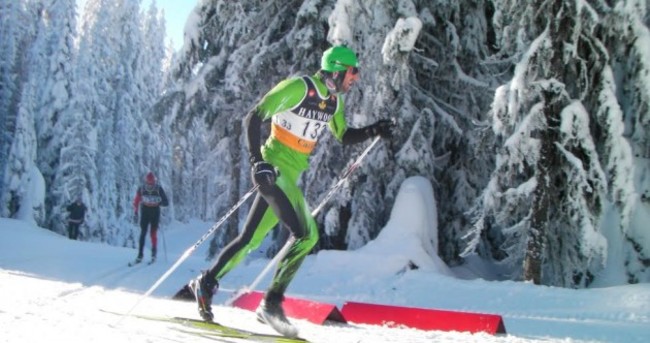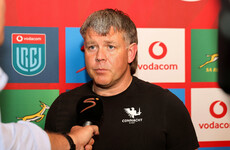IT ALL HAPPENED so fast — one minute, Jan Rossiter considered cross-country skiing to be little more than a hobby, the next he was representing Ireland at the Winter Olympics.
The impromptu nature of this recent development (“a lot of people are quite surprised,” he admits) is emphasised by the fact that Rossiter only got in touch with the Snowsports Association of Ireland in December to express a desire to represent the country of his birth in Sochi.
“I’m not the first Irish cross country skier,” he tells TheScore.ie. “And I knew if I were to compete internationally, it certainly would be for Ireland.
“The process was quite straightforward. I contacted the Snowsports Association of Ireland and then they registered me with the FIS — the International Skiing Federation. And I then had an international license to accumulate points for Ireland.”
(Rossiter pictured with his coach Petr Jakl)
Although the 26-year-old is one of five people representing Ireland at the Winter Olympics (at the time of the interview, he had yet to even meet his teammates), he bears the distinction of being the only athlete in the squad to have been born there.
“It was just after my second birthday that we moved from Cork to Kingston, Ontario in Canada,” says Rossiter, who was born to an Irish father and a Czech mother. “My grandparents are still living in Clonmel, so we try to visit as often as we can. We’d visit every other year on average.”
And while Rossiter has been competing for eight years in “local and university races,” it only recently dawned on him that the prospect of competing at the Winter Olympics might be a viable one.
“I skied a little bit every year between the ages of three and 18, quite recreationally,” he explains. “When I went off to university in Montreal, I joined the team there and we raced maybe five weekends a year and trained throughout the winter. It’s really just the last three winters that we’ve been competing at a higher level, as well as the last season, when there’s been a huge jump in the amount of training being done.
“It certainly wasn’t a long-term dream [to compete at the Winter Olympics]. So it sort of evolved in the last three or four years as I saw my skiing coming along. But it’s really been the last 18 months that I’ve fully committed to it.”
And it is a dream that he could easily have missed out on, as his qualification for the event was certainly less than straightforward.
“Overall, it went according to plan. The second qualification race did not go well, so things were a little stressful at that point. Then with the third, fourth and fifth qualification races, each one kept getting better and better, so that was incredibly exciting and encouraging.”
And how did he manage to overcome the initial setback?
“I try to relax and not worry about the implications of the race too much. I ski more efficiently if I’m relaxed. I skied the course a few days ahead of time and then just tried to ski as if I were training, except a little faster.”
(Rossiter pictured training ahead of the Games)
Rossiter is speaking to TheScore.ie from his training base in Austria, yet far from taking an opportunity to rest and recuperate following confirmation of his qualification, if anything, the last few days have felt more intense than ever.
“As soon as you miss more than one day on the snow, you really notice it,” he explains.
“There’s a lot more hours of training now. Since I have fewer races, I’m able to train a little more often. It’s an altitude similar to Sochi — we’re around 1,540 metres, which is higher than we would normally experience, so it’s good to be here.
“Luckily, travel went quite smoothly. We were able to get our kits here and get some good rest along the way. We started last Saturday — and we’ve been putting in about four hours a day. It’s been going well.”
And of course, this relentless training is undoubtedly necessary for such a grueling sport.
“The equipment is much lighter than for a downhill ski. About a third of the race course is on flat ground, a third is uphill and a third is downhill, roughly speaking. The athletes have to be incredibly fit to climb the hill and also have some downhill skiing abilities to stay in control on the downhill as well.”
Ireland have never won a medal at the Winter Olympics, though came close in 2002, when Clifton Wrottesley finished fourth in the Men’s Skeleton (an event in which another Irish representative, Sean Greenwood, will compete this year).
Nevertheless, Rossiter admits he won’t be the man to make history by becoming the first Irish athlete to secure silverware at the event.
“The spreads in time between the winner and the last-placed skier are quite large,” he explains. “So my goal would be to be as close as possible to the winner compared with some of my other races this year.”
Rossiter does have some advantages over his opponents, however. In Petr Jakl, he has a seasoned European coach of the highest calibre, while his work as a respiratory therapist provides him with some invaluable information that’s highly relevant to his sport. In addition, it also helped him to accrue some much-needed funds for this arduous trip.
“Logistically, having the job has enabled me to finance this whole endeavour. I stopped working in September and I’ve been able to train full time since then. In terms of having the anatomy and physiology knowledge, I find it makes the training more enjoyable and understandable.”
And so, with that topic in mind, will he continue to pursue his sporting dreams once the 2014 Winter Olympics are over, or is he finally going to devote himself entirely to the day job?
“I haven’t put much thought into it. I think you’ll have to ask me after the Games. But from a practical point of view, I’m going to have to focus on work, at least in the coming year, just to make ends meet again. And then we’ll decide from there.”
You can read more about Jan Rossiter at www.janrossiter.com













The Roy Keane.
Someone who hasn’t grasped the idea that 5 aside football is normally just for a bit of craic with mates midweek and there are no medals handed out at the end but plays and shouts like it’s the champions league final and is still fuming and talking about it 3 days later.
The Gaelic Footballer.
Doesn’t get the idea of a one-two, thinks short passing is a waste of time and likes belting the ball as hard as he can up the other end of the pitch. Never lets you out of the corner; in fact runs full belt at you and tries to kill you. Loves to drop the shoulder, especially when challenging for the ball near the side wall. Short shorts, big arse, hugely enthusiastic, often whoops, but never gets asked back again.
Classic
Also will never pass the ball backwards.
The better brother of a guy who made it professionaly. The only reason this guy didn’t was because of the drink. ‘Could have played with Celtic’. Slaughters you for 10 minutes then has a coronary for 50 minutes.
The Pro….
Struts onto the turf with the newest gear out, under armour and hairband, first touch of a donkey but counts every goal scored week in week out (I’ve 30 goals in astro this season) and to top it off asks around after the game does anybody know of a good physio cuz he’s feeling a bit tight in the groin….
Eh, what’s up with the dates on people’s comments – they’re all over the shop!?
The sub…
Usually one of the lads sons who come along to get him outta the house so the mother can catch up on Corrie. He’s probably around 12-14 years old. He’ll go in goals so “no hard shots lads, sure he’s only a chap!’ Which is a distinct advantage. He’ll turn out to be amazing and no matter how hard you hit it, he’ll dive full length, collecting the ball in mid flight, a few somersaults and rolls and he’s off up the pitch, nutmegging and steps overs to bate tha band before sticking it in the top corner. As he walks back up the pitch, he’s given a little reminder of what age group of lads he’s actually playing with and someone decides to ‘soften his cough’ by ‘puttin a pup in him’ which ultimately results in a screaming kid rolling around all ‘ronaldo-esque’ with a shoving match between his dad and the offending individual. But all is settled with a few pints in the local with the young lad sippin a lemonade and chompin on a packet o’ Tatyo texting his mates with indecipherable gobbledegook about the dinosaurs he’s destroyed earlier….!
The john terry… He’s around shagging your missus while your not at home
The peter bonetti…..The keeper who is like a cat in 5 a side goals… But gets caught out on the big pitch!
The Heart – possesses all the drive, will and spirit a manager could ever ask of a player. Shows up every week and runs himself into the ground but ultimately has two left shins
Also known as the Zinedine Kilbane. Which would make it 2 right shins.
The Deer
Happy out chasing fellas and the ball. Gets caught in the headlights upon receiving said ball
The Hub
This is the guy who believes that the only good pass is a pass to him – generally loud and persistent.
The had trials ……
The muppet who was been chased by utd and Liverpool as a kid but wanted to do his leaving first! Turns out to be crap and then blames pitch,ball,lighting,his team,his footwear,drink from last night,injury……..
He wouldve made it if it wasnt for the drink…….
Forgot the dreaded “toy boy”. Shows up in the full Real Madrid kit with sparkling new green Astro boots wearing a head bank and gold cross around his neck. Cries off injured after 5 mins as everyone realises he’s awful.
For whatever reason somebody has pulled out due to “work”, always the same person, and the only replacement is another players son or nephew. The next 60 minutes involve getting nutmegged repeatedly and chasing his shadow.
The Rainman – really sweaty guy, with wet marks on chest, armpits, groin after 20secs of play. Spray of water in his wake and if you make any contact with, you may actually drown. Drinks out of everyone’s bottles and is a consistent back washer!! In a nutshell, wet!!
Nothing else happened except my goal… You’ve hammered him 17 3 but he’s scored a good goal… Maybe the best goal of the game but he’s otherwise been abysmal…. He ruffles your keepers head as you leave and tells him… Ha you won’t forget that one in a hurry…. You meet him in a boozer five nights later and he makes you lose the will to live jabbering on about it
“he takes a first touch that’s heavier than a black hole” – you my friend need to get a script writing role for Jim Beglin! http://www.youtube.com/watch?v=KKw3EO3xpQc (1.22, in the best video ever produced by RTE)
The sweaty guy. Starts pumpin after 5 mins. Or the football cogs guy. Catches ure ankle with a stud and just says ‘oh sorry, you alrite ?’ As he jogs on.
The Heather Mills. Can only pass/shoot with one foot which makes him as easy to read, can also be called the Roald Dahl.